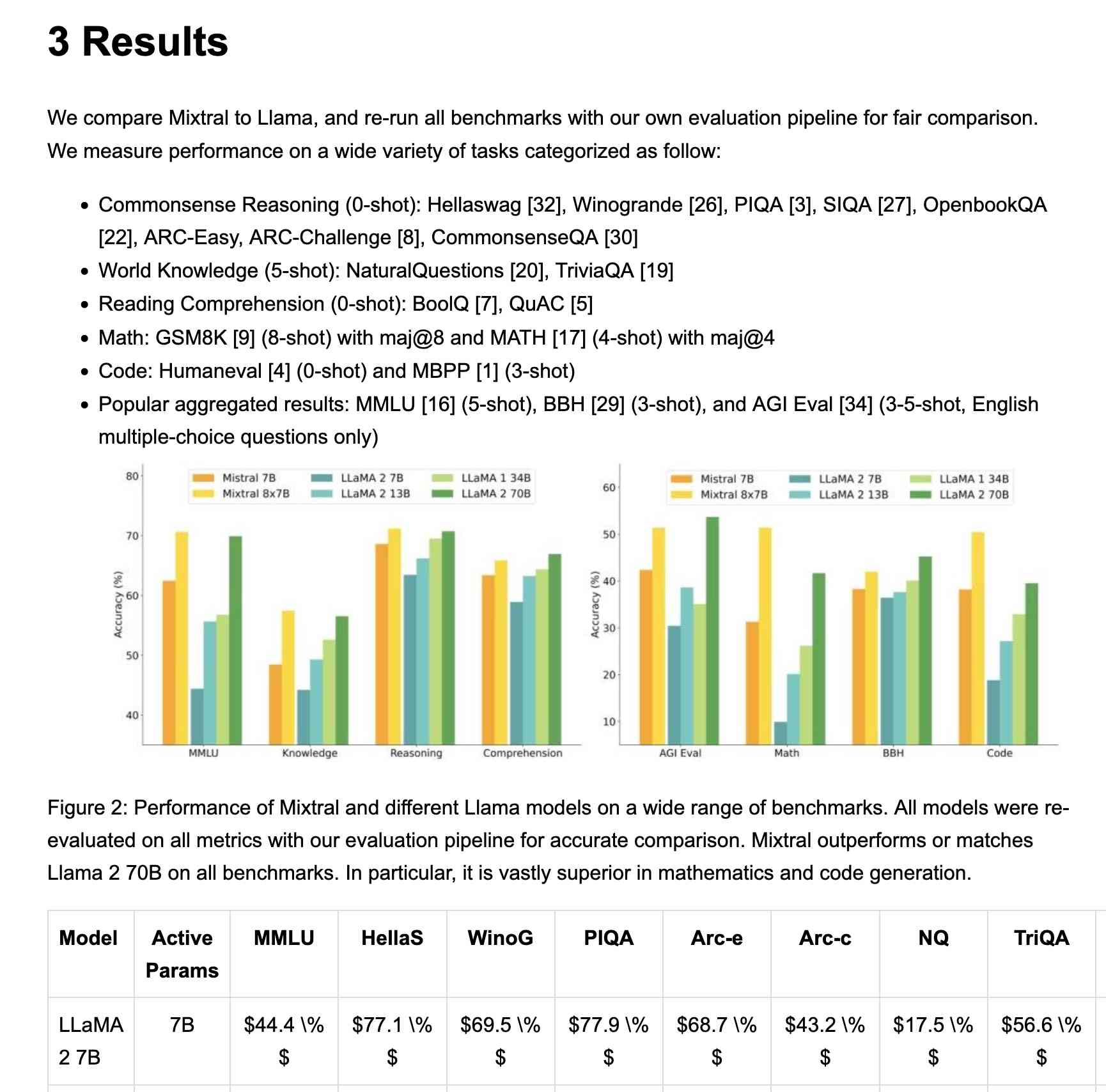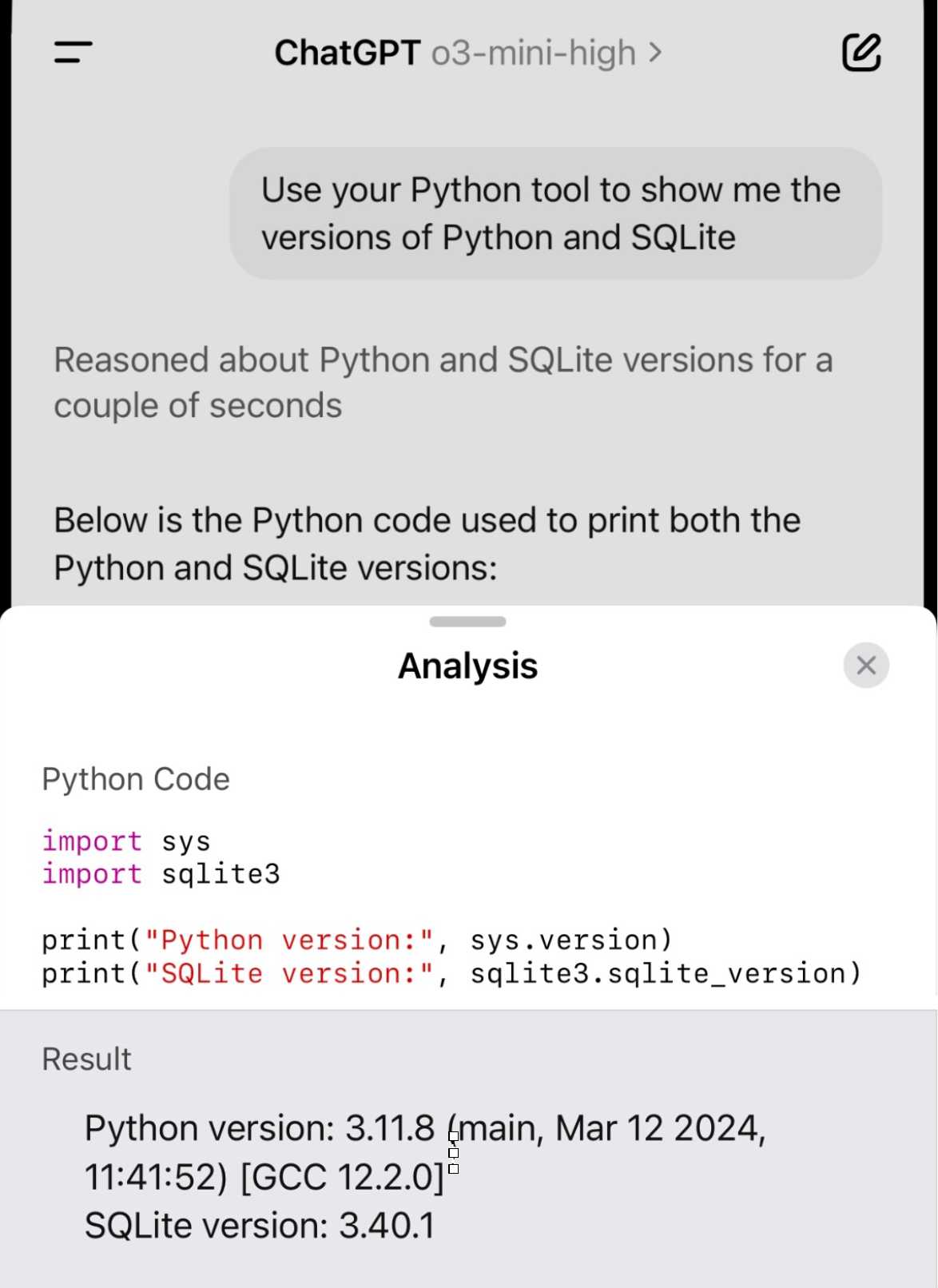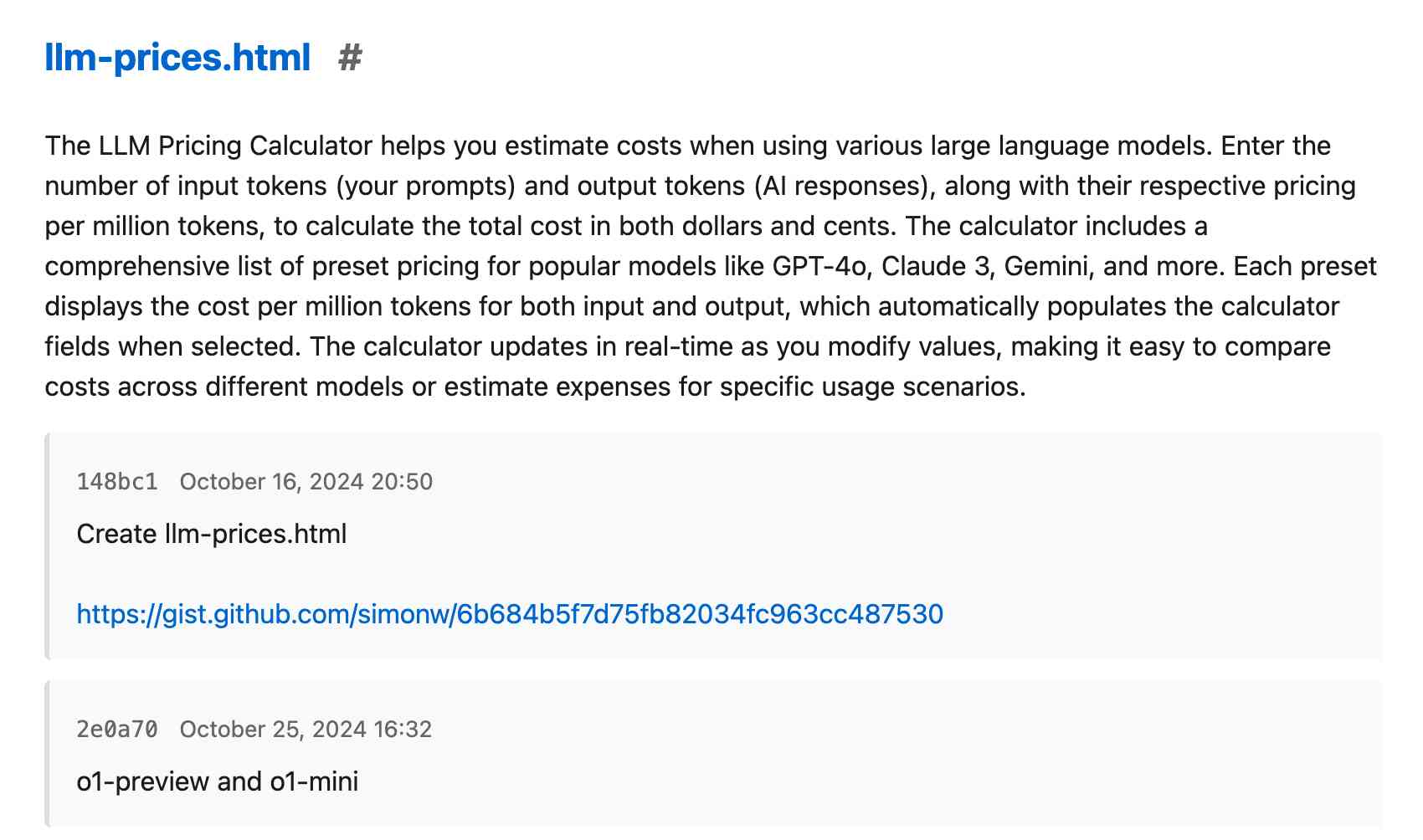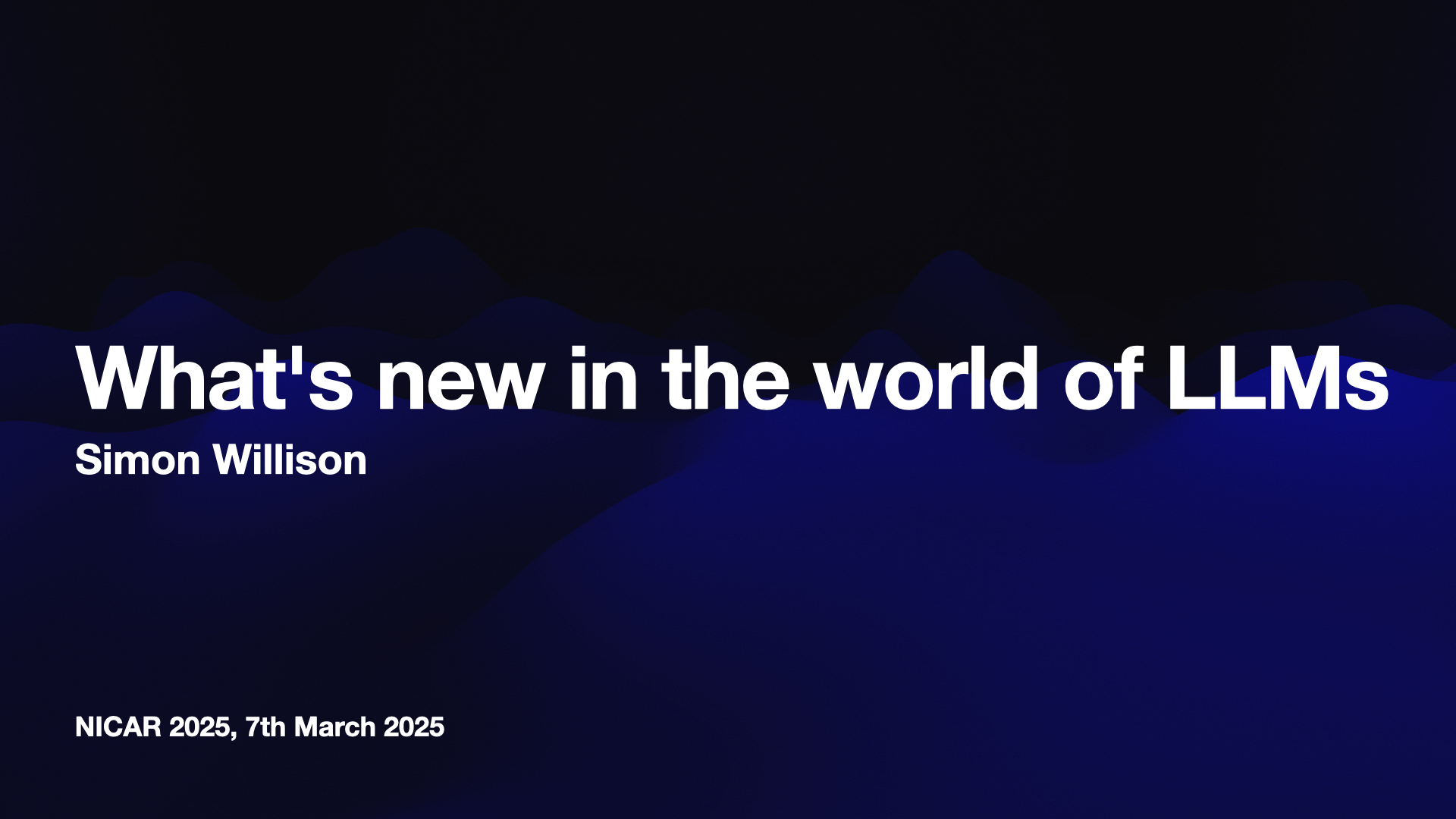1,581 posts tagged “llms”
Large Language Models (LLMs) are the class of technology behind generative text AI systems like OpenAI's ChatGPT, Google's Gemini and Anthropic's Claude.
2025
How ProPublica Uses AI Responsibly in Its Investigations. Charles Ornstein describes how ProPublic used an LLM to help analyze data for their recent story A Study of Mint Plants. A Device to Stop Bleeding. This Is the Scientific Research Ted Cruz Calls “Woke.” by Agnel Philip and Lisa Song.
They ran ~3,400 grant descriptions through a prompt that included the following:
As an investigative journalist, I am looking for the following information
--
woke_description: A short description (at maximum a paragraph) on why this grant is being singled out for promoting "woke" ideology, Diversity, Equity, and Inclusion (DEI) or advanced neo-Marxist class warfare propaganda. Leave this blank if it's unclear.
why_flagged: Look at the "STATUS", "SOCIAL JUSTICE CATEGORY", "RACE CATEGORY", "GENDER CATEGORY" and "ENVIRONMENTAL JUSTICE CATEGORY" fields. If it's filled out, it means that the author of this document believed the grant was promoting DEI ideology in that way. Analyze the "AWARD DESCRIPTIONS" field and see if you can figure out why the author may have flagged it in this way. Write it in a way that is thorough and easy to understand with only one description per type and award.
citation_for_flag: Extract a very concise text quoting the passage of "AWARDS DESCRIPTIONS" that backs up the "why_flagged" data.
This was only the first step in the analysis of the data:
Of course, members of our staff reviewed and confirmed every detail before we published our story, and we called all the named people and agencies seeking comment, which remains a must-do even in the world of AI.
I think journalists are particularly well positioned to take advantage of LLMs in this way, because a big part of journalism is about deriving the truth from multiple unreliable sources of information. Journalists are deeply familiar with fact-checking, which is a critical skill if you're going to report with the assistance of these powerful but unreliable models.
Agnel Philip:
The tech holds a ton of promise in lead generation and pointing us in the right direction. But in my experience, it still needs a lot of human supervision and vetting. If used correctly, it can both really speed up the process of understanding large sets of information, and if you’re creative with your prompts and critically read the output, it can help uncover things that you may not have thought of.
Adding AI-generated descriptions to my tools collection
The /colophon page on my tools.simonwillison.net site lists all 78 of the HTML+JavaScript tools I’ve built (with AI assistance) along with their commit histories, including links to prompting transcripts. I wrote about how I built that colophon the other day. It now also includes a description of each tool, generated using Claude 3.7 Sonnet.
[... 741 words]Xata Agent (via) Xata are a hosted PostgreSQL company who also develop the open source pgroll and pgstream schema migration tools.
Their new "Agent" tool is a system that helps monitor and optimize a PostgreSQL server using prompts to LLMs.
Any time I see a new tool like this I go hunting for the prompts. It looks like the main system prompts for orchestrating the tool live here - here's a sample:
Provide clear, concise, and accurate responses to questions. Use the provided tools to get context from the PostgreSQL database to answer questions. When asked why a query is slow, call the explainQuery tool and also take into account the table sizes. During the initial assessment use the getTablesAndInstanceInfo, getPerfromanceAndVacuumSettings, and getPostgresExtensions tools. When asked to run a playbook, use the getPlaybook tool to get the playbook contents. Then use the contents of the playbook as an action plan. Execute the plan step by step.
The really interesting thing is those playbooks, each of which is implemented as a prompt in the lib/tools/playbooks.ts file. There are six of these so far:
SLOW_QUERIES_PLAYBOOKGENERAL_MONITORING_PLAYBOOKTUNING_PLAYBOOKINVESTIGATE_HIGH_CPU_USAGE_PLAYBOOKINVESTIGATE_HIGH_CONNECTION_COUNT_PLAYBOOKINVESTIGATE_LOW_MEMORY_PLAYBOOK
Here's the full text of INVESTIGATE_LOW_MEMORY_PLAYBOOK:
Objective: To investigate and resolve low freeable memory in the PostgreSQL database. Step 1: Get the freeable memory metric using the tool getInstanceMetric. Step 3: Get the instance details and compare the freeable memory with the amount of memory available. Step 4: Check the logs for any indications of memory pressure or out of memory errors. If there are, make sure to report that to the user. Also this would mean that the situation is critical. Step 4: Check active queries. Use the tool getConnectionsGroups to get the currently active queries. If a user or application stands out for doing a lot of work, record that to indicate to the user. Step 5: Check the work_mem setting and shared_buffers setting. Think if it would make sense to reduce these in order to free up memory. Step 6: If there is no clear root cause for using memory, suggest to the user to scale up the Postgres instance. Recommend a particular instance class.
This is the first time I've seen prompts arranged in a "playbooks" pattern like this. What a weird and interesting way to write software!
Today we release OLMo 2 32B, the most capable and largest model in the OLMo 2 family, scaling up the OLMo 2 training recipe used for our 7B and 13B models released in November. It is trained up to 6T tokens and post-trained using Tulu 3.1. OLMo 2 32B is the first fully-open model (all data, code, weights, and details are freely available) to outperform GPT3.5-Turbo and GPT-4o mini on a suite of popular, multi-skill academic benchmarks.
— Ai2, OLMo 2 32B release announcement
Anthropic API: Text editor tool (via) Anthropic released a new "tool" today for text editing. It looks similar to the tool they offered as part of their computer use beta API, and the trick they've been using for a while in both Claude Artifacts and the new Claude Code to more efficiently edit files there.
The new tool requires you to implement several commands:
view- to view a specified file - either the whole thing or a specified rangestr_replace- execute an exact string match replacement on a filecreate- create a new file with the specified contentsinsert- insert new text after a specified line numberundo_edit- undo the last edit made to a specific file
Providing implementations of these commands is left as an exercise for the developer.
Once implemented, you can have conversations with Claude where it knows that it can request the content of existing files, make modifications to them and create new ones.
There's quite a lot of assembly required to start using this. I tried vibe coding an implementation by dumping a copy of the documentation into Claude itself but I didn't get as far as a working program - it looks like I'd need to spend a bunch more time on that to get something to work, so my effort is currently abandoned.
This was introduced as in a post on Token-saving updates on the Anthropic API, which also included a simplification of their token caching API and a new Token-efficient tool use (beta) where sending a token-efficient-tools-2025-02-19 beta header to Claude 3.7 Sonnet can save 14-70% of the tokens needed to define tools and schemas.
Introducing Command A: Max performance, minimal compute (via) New LLM release from Cohere. It's interesting to see which aspects of the model they're highlighting, as an indicator of what their commercial customers value the most (highlights mine):
Command A delivers maximum performance with minimal hardware costs when compared to leading proprietary and open-weights models, such as GPT-4o and DeepSeek-V3. For private deployments, Command A excels on business-critical agentic and multilingual tasks, while being deployable on just two GPUs, compared to other models that typically require as many as 32. [...]
With a serving footprint of just two A100s or H100s, it requires far less compute than other comparable models on the market. This is especially important for private deployments. [...]
Its 256k context length (2x most leading models) can handle much longer enterprise documents. Other key features include Cohere’s advanced retrieval-augmented generation (RAG) with verifiable citations, agentic tool use, enterprise-grade security, and strong multilingual performance.
It's open weights but very much not open source - the license is Creative Commons Attribution Non-Commercial and also requires adhering to their Acceptable Use Policy.
Cohere offer it for commercial use via "contact us" pricing or through their API. I released llm-command-r 0.3 adding support for this new model, plus their smaller and faster Command R7B (released in December) and support for structured outputs via LLM schemas.
(I found a weird bug with their schema support where schemas that end in an integer output a seemingly limitless integer - in my experiments it affected Command R and the new Command A but not Command R7B.)
Notes on Google’s Gemma 3
Google’s Gemma team released an impressive new model today (under their not-open-source Gemma license). Gemma 3 comes in four sizes—1B, 4B, 12B, and 27B—and while 1B is text-only the larger three models are all multi-modal for vision:
[... 804 words]OpenAI Agents SDK. OpenAI's other big announcement today (see also) - a Python library (openai-agents) for building "agents", which is a replacement for their previous swarm research project.
In this project, an "agent" is a class that configures an LLM with a system prompt an access to specific tools.
An interesting concept in this one is the concept of handoffs, where one agent can chose to hand execution over to a different system-prompt-plus-tools agent treating it almost like a tool itself. This code example illustrates the idea:
from agents import Agent, handoff billing_agent = Agent( name="Billing agent" ) refund_agent = Agent( name="Refund agent" ) triage_agent = Agent( name="Triage agent", handoffs=[billing_agent, handoff(refund_agent)] )
The library also includes guardrails - classes you can add that attempt to filter user input to make sure it fits expected criteria. Bits of this look suspiciously like trying to solve AI security problems with more AI to me.
OpenAI API: Responses vs. Chat Completions. OpenAI released a bunch of new API platform features this morning under the headline "New tools for building agents" (their somewhat mushy interpretation of "agents" here is "systems that independently accomplish tasks on behalf of users").
A particularly significant change is the introduction of a new Responses API, which is a slightly different shape from the Chat Completions API that they've offered for the past couple of years and which others in the industry have widely cloned as an ad-hoc standard.
In this guide they illustrate the differences, with a reassuring note that:
The Chat Completions API is an industry standard for building AI applications, and we intend to continue supporting this API indefinitely. We're introducing the Responses API to simplify workflows involving tool use, code execution, and state management. We believe this new API primitive will allow us to more effectively enhance the OpenAI platform into the future.
An API that is going away is the Assistants API, a perpetual beta first launched at OpenAI DevDay in 2023. The new responses API solves effectively the same problems but better, and assistants will be sunset "in the first half of 2026".
The best illustration I've seen of the differences between the two is this giant commit to the openai-python GitHub repository updating ALL of the example code in one go.
The most important feature of the Responses API (a feature it shares with the old Assistants API) is that it can manage conversation state on the server for you. An oddity of the Chat Completions API is that you need to maintain your own records of the current conversation, sending back full copies of it with each new prompt. You end up making API calls that look like this (from their examples):
{
"model": "gpt-4o-mini",
"messages": [
{
"role": "user",
"content": "knock knock.",
},
{
"role": "assistant",
"content": "Who's there?",
},
{
"role": "user",
"content": "Orange."
}
]
}These can get long and unwieldy - especially when attachments such as images are involved - but the real challenge is when you start integrating tools: in a conversation with tool use you'll need to maintain that full state and drop messages in that show the output of the tools the model requested. It's not a trivial thing to work with.
The new Responses API continues to support this list of messages format, but you also get the option to outsource that to OpenAI entirely: you can add a new "store": true property and then in subsequent messages include a "previous_response_id: response_id key to continue that conversation.
This feels a whole lot more natural than the Assistants API, which required you to think in terms of threads, messages and runs to achieve the same effect.
Also fun: the Response API supports HTML form encoding now in addition to JSON:
curl https://api.openai.com/v1/responses \
-u :$OPENAI_API_KEY \
-d model="gpt-4o" \
-d input="What is the capital of France?"
I found that in an excellent Twitter thread providing background on the design decisions in the new API from OpenAI's Atty Eleti. Here's a nitter link for people who don't have a Twitter account.
New built-in tools
A potentially more exciting change today is the introduction of default tools that you can request while using the new Responses API. There are three of these, all of which can be specified in the "tools": [...] array.
{"type": "web_search_preview"}- the same search feature available through ChatGPT. The documentation doesn't clarify which underlying search engine is used - I initially assumed Bing, but the tool documentation links to this Overview of OpenAI Crawlers page so maybe it's entirely in-house now? Web search is priced at between $25 and $50 per thousand queries depending on if you're using GPT-4o or GPT-4o mini and the configurable size of your "search context".{"type": "file_search", "vector_store_ids": [...]}provides integration with the latest version of their file search vector store, mainly used for RAG. "Usage is priced at $2.50 per thousand queries and file storage at $0.10/GB/day, with the first GB free".{"type": "computer_use_preview", "display_width": 1024, "display_height": 768, "environment": "browser"}is the most surprising to me: it's tool access to the Computer-Using Agent system they built for their Operator product. This one is going to be a lot of fun to explore. The tool's documentation includes a warning about prompt injection risks. Though on closer inspection I think this may work more like Claude Computer Use, where you have to run the sandboxed environment yourself rather than outsource that difficult part to them.
I'm still thinking through how to expose these new features in my LLM tool, which is made harder by the fact that a number of plugins now rely on the default OpenAI implementation from core, which is currently built on top of Chat Completions. I've been worrying for a while about the impact of our entire industry building clones of one proprietary API that might change in the future, I guess now we get to see how that shakes out!
Here’s how I use LLMs to help me write code
Online discussions about using Large Language Models to help write code inevitably produce comments from developers who’s experiences have been disappointing. They often ask what they’re doing wrong—how come some people are reporting such great results when their own experiments have proved lacking?
[... 5,178 words]llm-openrouter 0.4. I found out this morning that OpenRouter include support for a number of (rate-limited) free API models.
I occasionally run workshops on top of LLMs (like this one) and being able to provide students with a quick way to obtain an API key against models where they don't have to setup billing is really valuable to me!
This inspired me to upgrade my existing llm-openrouter plugin, and in doing so I closed out a bunch of open feature requests.
Consider this post the annotated release notes:
- LLM schema support for OpenRouter models that support structured output. #23
I'm trying to get support for LLM's new schema feature into as many plugins as possible.
OpenRouter's OpenAI-compatible API includes support for the response_format structured content option, but with an important caveat: it only works for some models, and if you try to use it on others it is silently ignored.
I filed an issue with OpenRouter requesting they include schema support in their machine-readable model index. For the moment LLM will let you specify schemas for unsupported models and will ignore them entirely, which isn't ideal.
llm openrouter keycommand displays information about your current API key. #24
Useful for debugging and checking the details of your key's rate limit.
llm -m ... -o online 1enables web search grounding against any model, powered by Exa. #25
OpenRouter apparently make this feature available to every one of their supported models! They're using new-to-me Exa to power this feature, an AI-focused search engine startup who appear to have built their own index with their own crawlers (according to their FAQ). This feature is currently priced by OpenRouter at $4 per 1000 results, and since 5 results are returned for every prompt that's 2 cents per prompt.
llm openrouter modelscommand for listing details of the OpenRouter models, including a--jsonoption to get JSON and a--freeoption to filter for just the free models. #26
This offers a neat way to list the available models. There are examples of the output in the comments on the issue.
- New option to specify custom provider routing:
-o provider '{JSON here}'. #17
Part of OpenRouter's USP is that it can route prompts to different providers depending on factors like latency, cost or as a fallback if your first choice is unavailable - great for if you are using open weight models like Llama which are hosted by competing companies.
The options they provide for routing are very thorough - I had initially hoped to provide a set of CLI options that covered all of these bases, but I decided instead to reuse their JSON format and forward those options directly on to the model.
It seems to me that "vibe checks" for how smart a model feels are easily gameable by making it have a better personality.
My guess is that it's most of the reason Sonnet 3.5.1 was so beloved. Its personality was made much more appealing, compared to e. g. OpenAI's corporate drones. [...]
Deep Research was this for me, at first. Some of its summaries were just pleasant to read, they felt so information-dense and intelligent! Not like typical AI slop at all! But then it turned out most of it was just AI slop underneath anyway, and now my slop-recognition function has adjusted and the effect is gone.
— Thane Ruthenis, A Bear Case: My Predictions Regarding AI Progress
I've been using Claude Code for a couple of days, and it has been absolutely ruthless in chewing through legacy bugs in my gnarly old code base. It's like a wood chipper fueled by dollars. It can power through shockingly impressive tasks, using nothing but chat. [...]
Claude Code's form factor is clunky as hell, it has no multimodal support, and it's hard to juggle with other tools. But it doesn't matter. It might look antiquated but it makes Cursor, Windsurf, Augment and the rest of the lot (yeah, ours too, and Copilot, let's be honest) FEEL antiquated.
— Steve Yegge, who works on Cody at Sourcegraph
What’s new in the world of LLMs, for NICAR 2025
I presented two sessions at the NICAR 2025 data journalism conference this year. The first was this one based on my review of LLMs in 2024, extended by several months to cover everything that’s happened in 2025 so far. The second was a workshop on Cutting-edge web scraping techniques, which I’ve written up separately.
[... 2,797 words]Cutting-edge web scraping techniques at NICAR. Here's the handout for a workshop I presented this morning at NICAR 2025 on web scraping, focusing on lesser know tips and tricks that became possible only with recent developments in LLMs.
For workshops like this I like to work off an extremely detailed handout, so that people can move at their own pace or catch up later if they didn't get everything done.
The workshop consisted of four parts:
- Building a Git scraper - an automated scraper in GitHub Actions that records changes to a resource over time
- Using in-browser JavaScript and then shot-scraper to extract useful information
- Using LLM with both OpenAI and Google Gemini to extract structured data from unstructured websites
- Video scraping using Google AI Studio
I released several new tools in preparation for this workshop (I call this "NICAR Driven Development"):
- git-scraper-template template repository for quickly setting up new Git scrapers, which I wrote about here
- LLM schemas, finally adding structured schema support to my LLM tool
- shot-scraper har for archiving pages as HTML Archive files - though I cut this from the workshop for time
I also came up with a fun way to distribute API keys for workshop participants: I had Claude build me a web page where I can create an encrypted message with a passphrase, then share a URL to that page with users and give them the passphrase to unlock the encrypted message. You can try that at tools.simonwillison.net/encrypt - or use this link and enter the passphrase "demo":

Apple Is Delaying the ‘More Personalized Siri’ Apple Intelligence Features. Apple told John Gruber (and other Apple press) this about the new "personalized" Siri:
It’s going to take us longer than we thought to deliver on these features and we anticipate rolling them out in the coming year.
I have a hunch that this delay might relate to security.
These new Apple Intelligence features involve Siri responding to requests to access information in applications and then performing actions on the user's behalf.
This is the worst possible combination for prompt injection attacks! Any time an LLM-based system has access to private data, tools it can call, and exposure to potentially malicious instructions (like emails and text messages from untrusted strangers) there's a significant risk that an attacker might subvert those tools and use them to damage or exfiltrating a user's data.
I published this piece about the risk of prompt injection to personal digital assistants back in November 2023, and nothing has changed since then to make me think this is any less of an open problem.
Mistral OCR (via) New closed-source specialist OCR model by Mistral - you can feed it images or a PDF and it produces Markdown with optional embedded images.
It's available via their API, or it's "available to self-host on a selective basis" for people with stringent privacy requirements who are willing to talk to their sales team.
I decided to try out their API, so I copied and pasted example code from their notebook into my custom Claude project and told it:
Turn this into a CLI app, depends on mistralai - it should take a file path and an optional API key defauling to env vironment called MISTRAL_API_KEY
After some further iteration / vibe coding I got to something that worked, which I then tidied up and shared as mistral_ocr.py.
You can try it out like this:
export MISTRAL_API_KEY='...'
uv run http://tools.simonwillison.net/python/mistral_ocr.py \
mixtral.pdf --html --inline-images > mixtral.html
I fed in the Mixtral paper as a PDF. The API returns Markdown, but my --html option renders that Markdown as HTML and the --inline-images option takes any images and inlines them as base64 URIs (inspired by monolith). The result is mixtral.html, a 972KB HTML file with images and text bundled together.
This did a pretty great job!

My script renders Markdown tables but I haven't figured out how to render inline Markdown MathML yet. I ran the command a second time and requested Markdown output (the default) like this:
uv run http://tools.simonwillison.net/python/mistral_ocr.py \
mixtral.pdf > mixtral.md
Here's that Markdown rendered as a Gist - there are a few MathML glitches so clearly the Mistral OCR MathML dialect and the GitHub Formatted Markdown dialect don't quite line up.
My tool can also output raw JSON as an alternative to Markdown or HTML - full details in the documentation.
The Mistral API is priced at roughly 1000 pages per dollar, with a 50% discount for batch usage.
The big question with LLM-based OCR is always how well it copes with accidental instructions in the text (can you safely OCR a document full of prompting examples?) and how well it handles text it can't write.
Mistral's Sophia Yang says it "should be robust" against following instructions in the text, and invited people to try and find counter-examples.
Alexander Doria noted that Mistral OCR can hallucinate text when faced with handwriting that it cannot understand.
monolith (via) Neat CLI tool built in Rust that can create a single packaged HTML file of a web page plus all of its dependencies.
cargo install monolith # or brew install
monolith https://simonwillison.net/ > simonwillison.html
That command produced this 1.5MB single file result. All of the linked images, CSS and JavaScript assets have had their contents inlined into base64 URIs in their src= and href= attributes.
I was intrigued as to how it works, so I dumped the whole repository into Gemini 2.0 Pro and asked for an architectural summary:
cd /tmp
git clone https://github.com/Y2Z/monolith
cd monolith
files-to-prompt . -c | llm -m gemini-2.0-pro-exp-02-05 \
-s 'architectural overview as markdown'
Here's what I got. Short version: it uses the reqwest, html5ever, markup5ever_rcdom and cssparser crates to fetch and parse HTML and CSS and extract, combine and rewrite the assets. It doesn't currently attempt to run any JavaScript.
Will the future of software development run on vibes? I got a few quotes in this piece by Benj Edwards about vibe coding, the term Andrej Karpathy coined for when you prompt an LLM to write code, accept all changes and keep feeding it prompts and error messages and see what you can get it to build.
Here's what I originally sent to Benj:
I really enjoy vibe coding - it's a fun way to play with the limits of these models. It's also useful for prototyping, where the aim of the exercise is to try out an idea and prove if it can work.
Where vibe coding fails is in producing maintainable code for production settings. I firmly believe that as a developer you have to take accountability for the code you produce - if you're going to put your name to it you need to be confident that you understand how and why it works - ideally to the point that you can explain it to somebody else.
Vibe coding your way to a production codebase is clearly a terrible idea. Most of the work we do as software engineers is about evolving existing systems, and for those the quality and understandability of the underlying code is crucial.
For experiments and low-stake projects where you want to explore what's possible and build fun prototypes? Go wild! But stay aware of the very real risk that a good enough prototype often faces pressure to get pushed to production.
If an LLM wrote every line of your code but you've reviewed, tested and understood it all, that's not vibe coding in my book - that's using an LLM as a typing assistant.
Demo of ChatGPT Code Interpreter running in o3-mini-high. OpenAI made GPT-4.5 available to Plus ($20/month) users today. I was a little disappointed with GPT-4.5 when I tried it through the API, but having access in the ChatGPT interface meant I could use it with existing tools such as Code Interpreter which made its strengths a whole lot more evident - that’s a transcript where I had it design and test its own version of the JSON Schema succinct DSL I published last week.
Riley Goodside then spotted that Code Interpreter has been quietly enabled for other models too, including the excellent o3-mini reasoning model. This means you can have o3-mini reason about code, write that code, test it, iterate on it and keep going until it gets something that works.

Code Interpreter remains my favorite implementation of the "coding agent" pattern, despite recieving very few upgrades in the two years after its initial release. Plugging much stronger models into it than the previous GPT-4o default makes it even more useful.
Nothing about this in the ChatGPT release notes yet, but I've tested it in the ChatGPT iOS app and mobile web app and it definitely works there.
Career Update: Google DeepMind -> Anthropic. Nicholas Carlini (previously) on joining Anthropic, driven partly by his frustration at friction he encountered publishing his research at Google DeepMind after their merge with Google Brain. His area of expertise is adversarial machine learning.
The recent advances in machine learning and language modeling are going to be transformative [d] But in order to realize this potential future in a way that doesn't put everyone's safety and security at risk, we're going to need to make a lot of progress---and soon. We need to make so much progress that no one organization will be able to figure everything out by themselves; we need to work together, we need to talk about what we're doing, and we need to start doing this now.
QwQ-32B: Embracing the Power of Reinforcement Learning (via) New Apache 2 licensed reasoning model from Qwen:
We are excited to introduce QwQ-32B, a model with 32 billion parameters that achieves performance comparable to DeepSeek-R1, which boasts 671 billion parameters (with 37 billion activated). This remarkable outcome underscores the effectiveness of RL when applied to robust foundation models pretrained on extensive world knowledge.
I had a lot of fun trying out their previous QwQ reasoning model last November. I demonstrated this new QwQ in my talk at NICAR about recent LLM developments. Here's the example I ran.
LM Studio just released GGUFs ranging in size from 17.2 to 34.8 GB. MLX have compatible weights published in 3bit, 4bit, 6bit and 8bit. Ollama has the new qwq too - it looks like they've renamed the previous November release qwq:32b-preview.
A Practical Guide to Implementing DeepSearch / DeepResearch. I really like the definitions Han Xiao from Jina AI proposes for the terms DeepSearch and DeepResearch in this piece:
DeepSearch runs through an iterative loop of searching, reading, and reasoning until it finds the optimal answer. [...]
DeepResearch builds upon DeepSearch by adding a structured framework for generating long research reports.
I've recently found myself cooling a little on the classic RAG pattern of finding relevant documents and dumping them into the context for a single call to an LLM.
I think this definition of DeepSearch helps explain why. RAG is about answering questions that fall outside of the knowledge baked into a model. The DeepSearch pattern offers a tools-based alternative to classic RAG: we give the model extra tools for running multiple searches (which could be vector-based, or FTS, or even systems like ripgrep) and run it for several steps in a loop to try to find an answer.
I think DeepSearch is a lot more interesting than DeepResearch, which feels to me more like a presentation layer thing. Pulling together the results from multiple searches into a "report" looks more impressive, but I still worry that the report format provides a misleading impression of the quality of the "research" that took place.
llm-ollama 0.9.0.
This release of the llm-ollama plugin adds support for schemas, thanks to a PR by Adam Compton.
Ollama provides very robust support for this pattern thanks to their structured outputs feature, which works across all of the models that they support by intercepting the logic that outputs the next token and restricting it to only tokens that would be valid in the context of the provided schema.
With Ollama and llm-ollama installed you can run even run structured schemas against vision prompts for local models. Here's one against Ollama's llama3.2-vision:
llm -m llama3.2-vision:latest \
'describe images' \
--schema 'species,description,count int' \
-a https://static.simonwillison.net/static/2025/two-pelicans.jpg
I got back this:
{
"species": "Pelicans",
"description": "The image features a striking brown pelican with its distinctive orange beak, characterized by its large size and impressive wingspan.",
"count": 1
}
(Actually a bit disappointing, as there are two pelicans and their beaks are brown.)
llm-mistral 0.11. I added schema support to this plugin which adds support for the Mistral API to LLM. Release notes:
Schemas now work with OpenAI, Anthropic, Gemini and Mistral hosted models, plus self-hosted models via Ollama and llm-ollama.
After publishing this piece, I was contacted by Anthropic who told me that Sonnet 3.7 would not be considered a 10^26 FLOP model and cost a few tens of millions of dollars to train, though future models will be much bigger.
Notes from my Accessibility and Gen AI podcast appearance
I was a guest on the most recent episode of the Accessibility + Gen AI Podcast, hosted by Eamon McErlean and Joe Devon. We had a really fun, wide-ranging conversation about a host of different topics. I’ve extracted a few choice quotes from the transcript.
[... 947 words]Regarding the recent blog post, I think a simpler explanation is that hallucinating a non-existent library is a such an inhuman error it throws people. A human making such an error would be almost unforgivably careless.
Hallucinations in code are the least dangerous form of LLM mistakes
A surprisingly common complaint I see from developers who have tried using LLMs for code is that they encountered a hallucination—usually the LLM inventing a method or even a full software library that doesn’t exist—and it crashed their confidence in LLMs as a tool for writing code. How could anyone productively use these things if they invent methods that don’t exist?
[... 1,052 words]llm-anthropic #24: Use new URL parameter to send attachments. Anthropic released a neat quality of life improvement today. Alex Albert:
We've added the ability to specify a public facing URL as the source for an image / document block in the Anthropic API
Prior to this, any time you wanted to send an image to the Claude API you needed to base64-encode it and then include that data in the JSON. This got pretty bulky, especially in conversation scenarios where the same image data needs to get passed in every follow-up prompt.
I implemented this for llm-anthropic and shipped it just now in version 0.15.1 (here's the commit) - I went with a patch release version number bump because this is effectively a performance optimization which doesn't provide any new features, previously LLM would accept URLs just fine and would download and then base64 them behind the scenes.
In testing this out I had a really impressive result from Claude 3.7 Sonnet. I found a newspaper page from 1900 on the Library of Congress (the "Worcester spy.") and fed a URL to the PDF into Sonnet like this:
llm -m claude-3.7-sonnet \
-a 'https://tile.loc.gov/storage-services/service/ndnp/mb/batch_mb_gaia_ver02/data/sn86086481/0051717161A/1900012901/0296.pdf' \
'transcribe all text from this image, formatted as markdown'

I haven't checked every sentence but it appears to have done an excellent job, at a cost of 16 cents.
As another experiment, I tried running that against my example people template from the schemas feature I released this morning:
llm -m claude-3.7-sonnet \
-a 'https://tile.loc.gov/storage-services/service/ndnp/mb/batch_mb_gaia_ver02/data/sn86086481/0051717161A/1900012901/0296.pdf' \
-t people
That only gave me two results - so I tried an alternative approach where I looped the OCR text back through the same template, using llm logs --cid with the logged conversation ID and -r to extract just the raw response from the logs:
llm logs --cid 01jn7h45x2dafa34zk30z7ayfy -r | \
llm -t people -m claude-3.7-sonnet
... and that worked fantastically well! The result started like this:
{
"items": [
{
"name": "Capt. W. R. Abercrombie",
"organization": "United States Army",
"role": "Commander of Copper River exploring expedition",
"learned": "Reported on the horrors along the Copper River in Alaska, including starvation, scurvy, and mental illness affecting 70% of people. He was tasked with laying out a trans-Alaskan military route and assessing resources.",
"article_headline": "MUCH SUFFERING",
"article_date": "1900-01-28"
},
{
"name": "Edward Gillette",
"organization": "Copper River expedition",
"role": "Member of the expedition",
"learned": "Contributed a chapter to Abercrombie's report on the feasibility of establishing a railroad route up the Copper River valley, comparing it favorably to the Seattle to Skaguay route.",
"article_headline": "MUCH SUFFERING",
"article_date": "1900-01-28"
}



